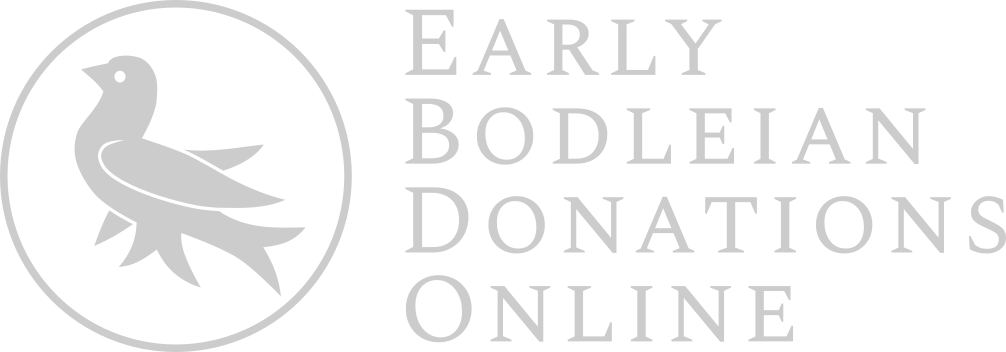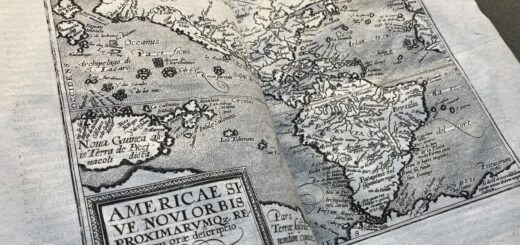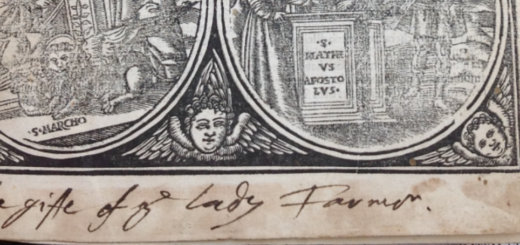Early donors to the Bodleian Library: Katherine Sandys and colonialism

One rich example of the Bodleian’s acquisition of books produced outside of Europe is provided by the donation of £20 (nearly £3000 today) in 1607 from Katherine Sandys née Bulkeley. Katherine was a shrewd businesswoman and the fourth wife of Edwin Sandys: a prominent MP, religious writer, and coloniser.
In his letters, Bodley complained about donors being allowed to choose the items purchased with their donations. But in the case of this donation, the choice of books made by Bodley and librarian Thomas James may have reflected the Sandys family’s involvement in early colonial activities such as those of the Virginia Company.
Such works included important travelogues containing finely engraved maps. These depicted parts of the world where at this point in history England was a weaker colonising force, such as the Middle East (Arthus Gotthard and Johann Bry’s The Seventh Part of the East Indies (1606)), and Asia (Cornelius Wytfliet’s Universal History of the Indies (1605)). Much like Matal’s atlas, these texts helped to expand Western readers’ understanding of these newly navigated areas. But like Lodge’s manuscript catechism, their subject matter also shone light on the ongoing efforts of European colonists to convert indigenous people to Christianity; making these books fitting acquisitions for a library founded by Bodley as a seat of Protestant learning.
Sandys’ donation also included works acquired from these areas in non-European languages unreadable to Western scholars. This included eight medical texts in Chinese, such as Gong Ting Chien’s Van Bin Hoiye Chun (Cure for all Illnesses) (1573) and Fang Gung’s, Dan shi shin fa (Thoughts on Dan Shi) (1522). Like the Bodleian’s other early Chinese works acquired from 1604 onwards, Sandys’ books are cheaply printed.

Some are unique survivals of sixteenth-century editions produced in the Fujin province on the southeastern coast of China during the Ming Dynasty. Too cheap to adorn the library of any serious Chinese scholar, they were probably sold by entrepreneurial local booksellers to Dutch merchants, and then exported to Europe by Dutch merchants engaged in the lucrative transcontinental spice trade in the employ of the newly formed Dutch East India Company. Bought in Amsterdam at auction by Bodley’s literary agent, when they arrived at the Bodleian they were simply recorded in the Benefactors’ Register under the catch-all heading ‘volumes in Chinese’. It was not until 1687, when the Chinese scholar and Catholic convert, Shen Fu-Tsung 沈福宗 (Michael Alphonsus), was paid by the Bodleian’s librarian Thomas Hyde to transliterate their titles that their contents became known in England. This enabled the creation of the first catalogue of Chinese Books for the Bodleian, and ultimately paved the way for future scholars to explore the library’s rich East Asian collections.
The books purchased with Sandys’ donation exemplify the complex relationship of the Bodleian’s early collections to colonialism and its legacy. Bodley’s acquisition of Chinese books is part of an explicitly colonial narrative. Likely acquired directly from the emergent oppressive power of the Dutch East India Company, these books were brought to Europe by a chartered company who would come to dominant East Asian trade routes across the Indian Ocean through the forced migration and killing of indigenous people. These books and their acquisition by a Western seat of learning promoted and glorified colonial projects of conquest, trade, and conversion to readers. Bodley did, albeit unintentionally, enable Fu-Tsung and Hyde’s later intellectual endeavours, paving the way for the first known direct Anglo-Chinese scholarly collaboration. The acquisition of these books also ensured the preservation of unique texts of international import and facilitated further study that continues at the library today. But as we continue to unlock their rich histories, we need to consciously centralise, and make accessible, the often-hidden colonial narratives that led to the arrival of items like these volumes at the Bodleian. However problematic and uncomfortable these may be, they are vital to furthering our understanding of the role colonialism played in developing the library’s collection.
My thanks go to Mamtimyn Sunuodula, Curator of Chinese Collections at the Bodleian, for translating the titles of Sinica 19/2 and 32/6.
This blog post was originally written for The Conveyor at the Bodleian Libraries Centre for the Study of the Book. It is one of a series exploring the Bodleian’s colonial and imperial connections, as part of the ‘We Are Our History’ project in 2022-24.
Sources
Cornelius Wytfliet, Histoire universelle des Indes, orientales et occidentales (Douai, 1605)
Arthus, Gotthard and Johann Theodor de Bry, Indiae Orientalis Pars Septima : Navigationes duas, Primam, trium Annorum, a Georgio Spilbergio, trium navium praefecto, Ann. 1601. ex Selandia in Indiam Orientalem susceptam (Frankfurt, 1606)
Gong Ting Chien,Van Bin Hoiye Chun (Cure for all Illnesses) (Fujin, 1573)
Fang Gung, Dan shi shin fa (Thoughts on Dan Shi) (Fujin, 1522)
David Helliwell, ‘Our Earliest Chinese Accession’, Serica (2012), https://serica.blog/2012/11/29/our-earliest-chinese-accession/
William Poole, ‘The Letters of Shen Fuzong to Thomas Hyde, 1687-88’, British Library Journal (2015), https://bl.iro.bl.uk/concern/articles/1227de6b-c20f-48fb-8411-b1f811ffa957
Kerry Ward, Networks of Empire: Forced Migration in the Dutch East India Company (Cambridge, 2009)



